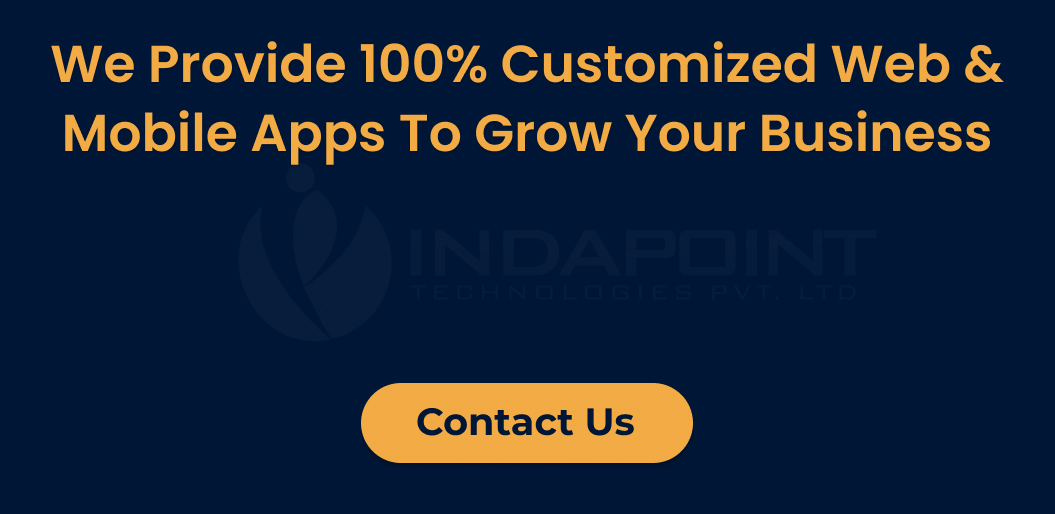Types of booking application & why it’s important for your business
November 9, 2021
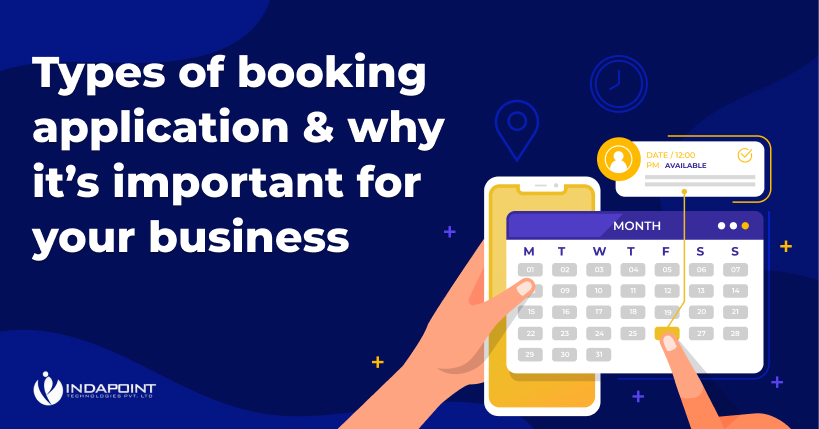
Mobile apps are taking over the globe, and there’s a strong chance that whatever you’re attempting to do already has an app for it. Some apps are games, while others are educational tools, while yet others allow you to listen to music or view movies, while still more assisting you in getting tasks done quickly and conveniently.
Booking applications are particularly useful for making day-to-day tasks easier. These apps can be utilized in a wide range of industries and businesses, including airlines, hotels, taxis, beauty salons, gyms, restaurants, and more.
Making a reservation ahead of time makes things easier.
Many businesses may provide their consumers with the best service by allowing them to book in advance. Customers may be certain that all they have to do is show up on time when they reserve a service, table, or appointment in advance. A booking app is a must-have for busy individuals nowadays, and who isn’t busy?
Booking apps are becoming a key part of many people’s lives, much like on-demand meal delivery apps have grown very popular among modern customers. Because more than half of all Internet users have a smartphone and more than half of them check their phones first thing in the morning, having a booking app is an important aspect of a successful company plan.
If you already have a successful business, a mobile app with a booking feature will help you expand your clientele. Providing the greatest service frequently entails combining comfort and convenience with effective service performance, and is there anything more comfortable and convenient than putting your service at your consumers’ fingertips?
However, it’s crucial to keep in mind that developing a booking app isn’t always straightforward. Booking apps are typically complex programmes with numerous features that tackle tricky scheduling issues, but this is more of your IT team’s worry than yours. What you need to remember is that a flawless customer experience is the ultimate goal of every service company. To reach this goal, your app must provide a set of specific features that make users’ lives easier.
What features do you think a good booking app should have?
Anyone creating any kind of programme (or product) should consider starting with a minimal viable product (MVP) version. Creating an MVP booking app can assist organizations in determining which features are essential to their app’s success, which are pleasant to have, and which aren’t.
Apps should always be designed with users’ needs in mind, taking into account their behavior and input to modify the path of the app’s development accordingly, since the main goal is to provide a seamless user experience.
Whether you start with an MVP or immediately launch the full version, you’ll want to incorporate as many of the following must-have features as possible to enhance your chances of growing your customer base.
Ability to create an account
Customers should be allowed to create their own accounts within the system, ideally. For three key reasons, this makes the process of customizing a lot easier:
Without having to recall everything on the to-do list, your clients will be able to schedule appointments and store them on their devices.
You’ll be able to recommend additional similar booking alternatives to your clients if you know what they’re booking the most frequently, thereby increasing your sales. This is accomplished through the use of machine learning to collect and evaluate massive volumes of data.
Many people appreciate loyalty programmes, and you may provide clients with an account with a simple way to obtain discounts, rewards, or even free consultations, which is a very appealing perk for them.
Simple, intuitive, and easy to use design
The design of an app is as vital as, if not more crucial than, the app itself. You want your app to be as comfortable and convenient as possible for users, which means it shouldn’t be cluttered or complicated.
Make the most critical elements easy to find while creating the app so that users aren’t exhausted or bored searching for them. Make the colour scheme pleasing to the eye, build soundless and seamless transitions, make graphics crystal clear, and endeavour to improve the user experience in any way you can. You’ll create an app that users will want to use again and again as a consequence of a crisp, clean, and intuitive design.
Reviewing and leaving reviews is accessible.
Customers frequently seek out services that they have never used before. It’s standard procedure – you may be new to the area or your friends may not have any excellent recommendations, but you still need to cross that item off your to-do list. This is where other people’s reviews come in handy.
A stunning image gallery can offer customers a solid if biassed, impression of what they can expect when they use your service, but nothing beats hearing multiple individuals talk about that new restaurant around the corner or that beauty shop down the street.
Your company is one that is trustworthy and works hard to keep consumers satisfied by allowing people to read reviews and post their own. The key is to understand how to effectively (and transparently) respond to bad evaluations.
Using CTAs to inspire people to take action
Call to action buttons, such as a book, share, and rate, are designed to urge users to take whatever action is beneficial to your company (and for them). Design the app so that it creates a user flow that motivates people to complete the action. Buttons should be easy to identify, utilize, and provide the user with a sense of success when they are completed.
Make sure that your app’s design is simple enough so users can simply make an appointment, reserve a table, or perform any other relevant CTA. This will ensure that your CTAs are both appealing and effective.
Social media services integration
These are the new holy pillars of advertising: “Like,” “Tweet,” and “Share.” If you want your business to succeed and spread to as many people as possible, you need to provide them with the means to share, and social media integration is just what you need. Consider this scenario: a consumer discovers a service they like, schedules an appointment, and then shares it with their friends on Twitter/Facebook/Instagram. This has two consequences:
- The booked service will be visible to the public.
- People will be able to see the app that was used to make the reservation.
Several payment alternatives are available
Billing and payment aspects can contribute to 20% or more of overall customer satisfaction, thus the payment procedure that consumers encounter is crucial. Make sure that clients may pay using a variety of methods, such as PayPal, credit cards, or even Bitcoin. The more payment options you provide, the happier customers will be when paying with their preferred method, and the more likely they will return to schedule your service again.
Customer service
A booking application acts as a middleman between clients and services, things might go wrong. To avoid misunderstandings, you’ll need customer care representatives to take calls and/or respond to emails, assisting clients in resolving any issues they may be having with the booking service. Sure, you want everything to be perfect, but that doesn’t always happen, and customer service is a valuable safety net for those few occasions when it doesn’t.Here are some of the different types of booking applications:
Bookings are divided into two types: 1) direct bookings and 2) indirect bookings. There are various variations within these various types of bookings, such as instant booking (guaranteed booking) and pending bookings etc.
Direct Bookings
Direct bookings are those that you have generated entirely through your networks. Direct bookings, for example, are those made through your website, over the phone, or as walk-ins. These bookings are frequently the result of your marketing and sales efforts.
Benefits of Direct Bookings
Taking direct bookings reduces your reliance on others to send your reservations. They frequently charge reduced fees (paid directly to the booking system provider). However, no reservation is free. If you’re getting direct bookings, it’s either because you put money into advertising your website, publishing pamphlets, or other marketing initiatives, or because you put time into meeting people, promoting your business on social media, or building up reviews and word-of-mouth.
Types of Direct Booking
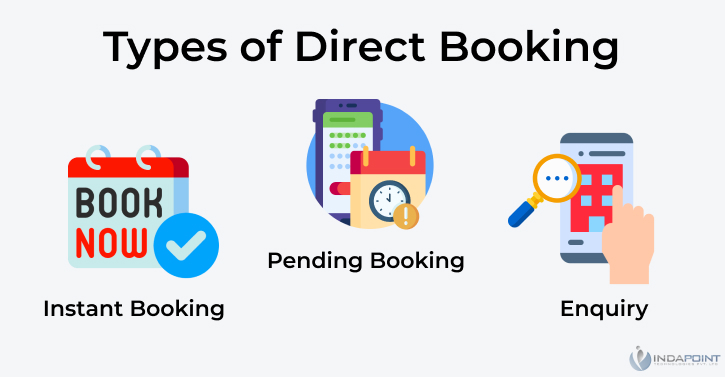
Instant Booking
Customers can choose the date, number of guests, and pay for their reservation right away. You’re now ready to deliver the experience without having to do any administrative work.
Pending Booking
Most online booking applications have only allowed instant bookings up until now. Indapoint has created a method that allows you to double-check bookings before accepting them. By being able to check your availability before accepting a booking, you can avoid overbooking. It also secures the customer’s commitment by pre authorizing their card, ensuring that when you accept, their reservation is verified. For those who still want to take online bookings, this is the best option.
Enquiry
This is an inbound inquiry rather than a reservation. At Indapoint, we make sure that all inquiries made through our online booking applications include important details such as the number of attendees, dates, and any additional requests. This means that when you receive inbound inquiries, you already have the majority of the information you’ll need to provide the potential consumer with is a price. There are two objectives here: 1) Send a checkout link as quickly as possible so they can book with you, and 2) Answer any questions they have and make sure what they expect and what you’re delivering are a good match.
Indirect Bookings
Any booking made through a third party is considered an indirect booking. Indirect bookings include those made through large OTAs (online travel agencies).
Benefits of Indirect Bookings
By sharing your experiences with others, indirect bookings might be an excellent method to generate revenue you wouldn’t have gotten otherwise. When used in conjunction with your direct bookings, it can help you develop your business faster and with less work than trying to produce more direct reservations on your own.Types of Online Booking Business
On-demand and in-advance booking apps can be generally categorized into two groups.
On-demand booking apps
On-demand apps are quick to respond and provide services that meet customers’ needs quickly. A user selects a product or service, places an order, tracks delivery, and receives it.
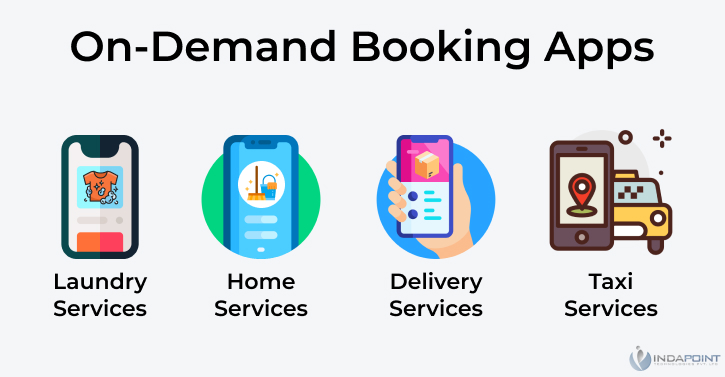
The on-demand economy is beneficial to several businesses.
Laundry services: Customers may have their clothes done quickly and easily using laundry service applications. This is how it performs: enter your zip code and street address, any notes, such as pick-up or delivery instructions, select a pick-up time for your garments and wait for the courier. After the service has completed your laundry, they will return it to you.
Home Services: Managing a home, as well as repairing appliances, is no longer a problem. Plumbers, electricians, air duct technicians, handymen, house painters, and cleaners – anybody you need may be found with just a few clicks using home service applications. For example, the application requires you to first enter the address where you want the service delivered. Then you specify a rough time frame: one hour for little jobs, two to three hours for medium-sized projects, and four hours or more for larger datasets.
Delivery Services: It might be difficult to manage yours is fleet of vehicles and personnel. Goods providers can outsource their fleet operations and focus on their business rather than hiring staff and managing deliveries with dedicated delivery services. These services are in charge of every aspect of cargo transportation.
Taxi Services: The need for taxi booking apps is high. They provide numerous benefits to individuals seeking a solution to parking concerns and other issues associated with modern transportation.
In- advance Booking applications for business
You may use calendars to plan appointments with in-advance booking apps. In-advance booking is beneficial to a variety of industries.
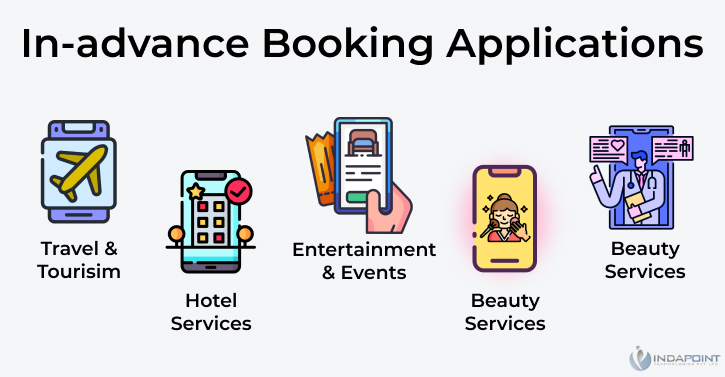
Travel & Tourism: When it comes to arranging a trip, one-third of travellers throughout the world are interested in digital assistants. It’s no surprise, given that travel apps allow users to browse, schedule, and purchase flights, cruises, and car rentals. You only need to input a destination city and flight dates to buy a flight, for example. Then you may use the travel app to find the greatest deals. Some apps allow users to book tickets directly within the app, while others send users to airline websites where they can book tickets.
Hotels: Hotel booking applications provide a plethora of advantages to their consumers. They assist vacationers and business travellers in finding and booking hotel rooms. They also provide consumers with access to hot discounts and last-minute bookings.
Entertainment & Events: From reserving locations for gatherings to hiring boats, event and entertainment applications provide a plethora of options. Sports, games, festivals, and other events are all part of this industry.
PVR Cinemas is a movie ticket booking app in India that allows users to purchase tickets to any of the app’s participating cinemas. Simply pick a film from the list and go to a theater to see it. All theaters are sorted and listed by distance and showtimes. You can choose a seat and order meals once you’ve decided on a cinema. You can pay for your order when it has been confirmed.
Beauty Services: There’s no need to leave the house for a new manicure, haircut, or other aesthetic treatment. You’ll be taken to the salon. The only thing you’ll need is a phone app to schedule your beauty appointments. You can arrange an appointment by picking a service, a convenient date and time, and a stylist.
Doctor Office: People may simply and safely schedule doctor’s appointments online using booking software. The system confirms and registers the booking as soon as the date and time are selected. This procedure does not necessitate the use of any personnel.
Conclusion
It’s not easy to create a booking app, but with the correct development team and a clear vision for a mobile app, it may be extremely beneficial to a wide range of organizations. It’s critical to think about all of the features that could be added and the logistics of developing the app to ensure that the result fits.
Is booking software required for your business? Please do not hesitate to contact one of Indapoint’s Mobile Application Consultants for a full study of your project and an estimate of how long it will take to bring your concept to life.


